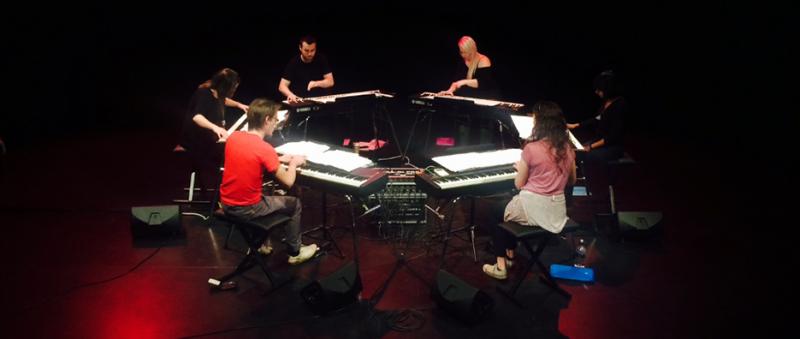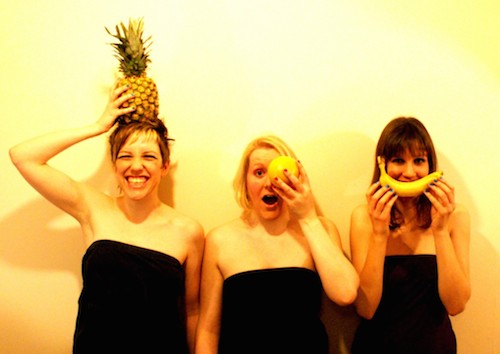Piano Circus, Juice Vocal Ensemble, Kings Place | reviews, news & interviews
Piano Circus, Juice Vocal Ensemble, Kings Place
Piano Circus, Juice Vocal Ensemble, Kings Place
A reinvented minimalist classic is let down by poor sound quality

It is not surprising that Piano Circus rarely play on six real pianos (although the photo on last night’s programme cover shows just that). The expense, the stage space required and the logistical complexity all militate against it.
Which is a shame as some of the playing was spectacular, incredibly tight and together. Piano Circus are individual virtuosos who put their egos to one side to produce a unity of approach which is more than impressive. To play so many streams of semiquavers without any one of the six putting a finger wrong witnesses to metronomic techniques and hours of rehearsal.
That said, the Piano Circus – and the music they play – make a reviewer’s job hard. There is little nuance to pick up in the music in terms of touch and articulation, melodic line or the weighting of chords, even if the instruments permitted such things. None of the pieces have solo moments to identify, or individual contributions to applaud. In fact, it really isn’t possible even to identify particular players; the group members are listed in alphabetical order, which may or may not be the order in which they sit, and there is no one leader. The performances stand or fall on the communal effort and contribution to the overall sound.
 The only sonic variety was courtesy of Juice Vocal Ensemble (pictured right), usually three singers but augmented to four for the world premiere of a new version of Louis Andriessen’s seminal De Staat. Originally composed for one of Andriessen’s typically idiosyncratic ensembles – quartets of female voices, oboes, horns, trumpets and trombones as well as pairs of pianos and harps with electric guitar and bass – this transcription (by James Young of Piano Circus) was true to the hard-edged original.
The only sonic variety was courtesy of Juice Vocal Ensemble (pictured right), usually three singers but augmented to four for the world premiere of a new version of Louis Andriessen’s seminal De Staat. Originally composed for one of Andriessen’s typically idiosyncratic ensembles – quartets of female voices, oboes, horns, trumpets and trombones as well as pairs of pianos and harps with electric guitar and bass – this transcription (by James Young of Piano Circus) was true to the hard-edged original.
Andriessen (born 1939) is the leading Dutch exponent of the minimalist style and De Staat (The Republic) was written in the early years of his success, and premiered in 1976. Taking extracts from Plato’s dialogue on the ideal state as its text, it is an avowedly political statement, and an unforgiving listen. Andriessen takes the repetitive gestures of Steve Reich but couches them in much harsher, more dissonant harmonies. He also throws influences ranging from Stravinsky to pop music into the mix, and churns them all up.
De Staat was one of the first minimal pieces to use the human voice, and Juice Vocal Ensemble, brilliant as they ever are, brought a welcome variety to the sound, although Andriessen’s stern and didactic vocal declamation does not give much scope for interpretation or conventional musicality.
By the end my ears were battered and ringing, and desperate for some respite
In the 1980s Andriessen co-wrote a wonderful book on Stravinsky called The Apollonian Clockwork, and the name could well apply to De Staat. It is music which sounds like a machine-like plaything of a god, both ordered and slightly chaotic. The piano arrangement flattens out the timbral rawness of the original, but points up Andriessen’s obsessive exploration of individual tetrachords, often minutes at a time on a single chord. Piano Circus rose to the challenge with a marvellously committed performance, although details of the playing were often lost in the amplification.
The pieces either side of De Staat did not rise to the same heights. David Lang’s face so pale, replacing the billed world premiere, was that saddest of pieces: one that sounds more interesting when described in the programme that it does when played. Apparently, but not audibly, built from a Dufay ballade, it made little impression.
More stirring, but outstaying its welcome somewhat, was Graham Fitkin’s Log, Line, Loud, a trilogy written for Piano Circus in 1989-1991. Fitkin’s language in these pieces is modal, as harmonically smooth as Andriessen’s is spiky. There are some well paced build-ups, textures becoming more and more layered and frenetic, with pounding boogie-woogie basslines and manic scales at the top end. But the last movement, Loud, is very true to its title and by the end my ears were battered and ringing and desperate for some respite.
rating
Explore topics
Share this article
The future of Arts Journalism
You can stop theartsdesk.com closing!
We urgently need financing to survive. Our fundraising drive has thus far raised £49,000 but we need to reach £100,000 or we will be forced to close. Please contribute here: https://gofund.me/c3f6033d
And if you can forward this information to anyone who might assist, we’d be grateful.

Subscribe to theartsdesk.com
Thank you for continuing to read our work on theartsdesk.com. For unlimited access to every article in its entirety, including our archive of more than 15,000 pieces, we're asking for £5 per month or £40 per year. We feel it's a very good deal, and hope you do too.
To take a subscription now simply click here.
And if you're looking for that extra gift for a friend or family member, why not treat them to a theartsdesk.com gift subscription?
more Classical music
 Hallé John Adams festival, Bridgewater Hall / RNCM, Manchester review - standing ovations for today's music
From 1980 to 2025 with the West Coast’s pied piper and his eager following
Hallé John Adams festival, Bridgewater Hall / RNCM, Manchester review - standing ovations for today's music
From 1980 to 2025 with the West Coast’s pied piper and his eager following
 Kaploukhii, Greenwich Chamber Orchestra, Cutts, St James's Piccadilly review - promising young pianist
A robust and assertive Beethoven concerto suggests a player to follow
Kaploukhii, Greenwich Chamber Orchestra, Cutts, St James's Piccadilly review - promising young pianist
A robust and assertive Beethoven concerto suggests a player to follow
 Robin Holloway: Music's Odyssey review - lessons in composition
Broad and idiosyncratic survey of classical music is insightful but slightly indigestible
Robin Holloway: Music's Odyssey review - lessons in composition
Broad and idiosyncratic survey of classical music is insightful but slightly indigestible
 Classical CDs: Wolf-pelts, clowns and social realism
British ballet scores, 19th century cello works and contemporary piano etudes
Classical CDs: Wolf-pelts, clowns and social realism
British ballet scores, 19th century cello works and contemporary piano etudes
 Bizet in 150th anniversary year: rich and rare French offerings from Palazzetto Bru Zane
Specialists in French romantic music unveil a treasure trove both live and on disc
Bizet in 150th anniversary year: rich and rare French offerings from Palazzetto Bru Zane
Specialists in French romantic music unveil a treasure trove both live and on disc
 Scottish Chamber Orchestra, Ibragimova, Queen’s Hall, Edinburgh review - rarities, novelties and drumrolls
A pity the SCO didn't pick a better showcase for a shining guest artist
Scottish Chamber Orchestra, Ibragimova, Queen’s Hall, Edinburgh review - rarities, novelties and drumrolls
A pity the SCO didn't pick a better showcase for a shining guest artist
 Kilsby, Parkes, Sinfonia of London, Wilson, Barbican review - string things zing and sing in expert hands
British masterpieces for strings plus other-worldly tenor and horn - and a muscular rarity
Kilsby, Parkes, Sinfonia of London, Wilson, Barbican review - string things zing and sing in expert hands
British masterpieces for strings plus other-worldly tenor and horn - and a muscular rarity
 From Historical to Hip-Hop, Classically Black Music Festival, Kings Place review - a cluster of impressive stars for the future
From quasi-Mozartian elegance to the gritty humour of a kitchen inspection
From Historical to Hip-Hop, Classically Black Music Festival, Kings Place review - a cluster of impressive stars for the future
From quasi-Mozartian elegance to the gritty humour of a kitchen inspection
 Shibe, LSO, Adès, Barbican review - gaudy and glorious new music alongside serene Sibelius
Adès’s passion makes persuasive case for the music he loves, both new and old
Shibe, LSO, Adès, Barbican review - gaudy and glorious new music alongside serene Sibelius
Adès’s passion makes persuasive case for the music he loves, both new and old
 Anja Mittermüller, Richard Fu, Wigmore Hall review - a glorious hall debut
The Austrian mezzo shines - at the age of 22
Anja Mittermüller, Richard Fu, Wigmore Hall review - a glorious hall debut
The Austrian mezzo shines - at the age of 22
 First Person: clarinettist Oliver Pashley on the new horizons of The Hermes Experiment's latest album
Compositions by members of this unusual quartet feature for the first time
First Person: clarinettist Oliver Pashley on the new horizons of The Hermes Experiment's latest album
Compositions by members of this unusual quartet feature for the first time

Add comment